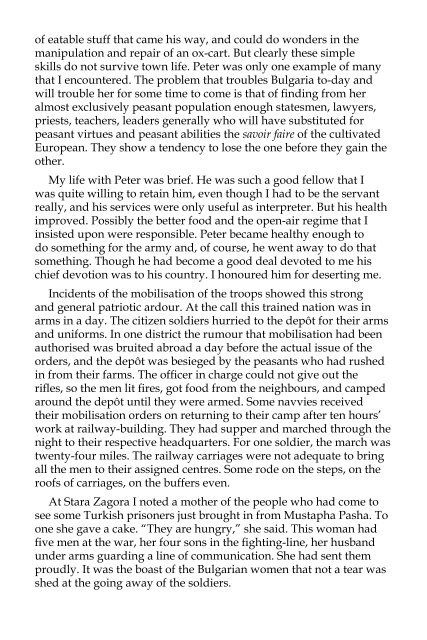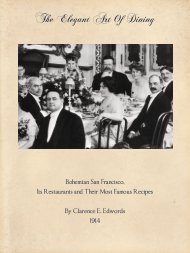Bulgaria e-book - iMedia
Bulgaria e-book - iMedia
Bulgaria e-book - iMedia
Create successful ePaper yourself
Turn your PDF publications into a flip-book with our unique Google optimized e-Paper software.
of eatable stuff that came his way, and could do wonders in the<br />
manipulation and repair of an ox-cart. But clearly these simple<br />
skills do not survive town life. Peter was only one example of many<br />
that I encountered. The problem that troubles <strong>Bulgaria</strong> to-day and<br />
will trouble her for some time to come is that of finding from her<br />
almost exclusively peasant population enough statesmen, lawyers,<br />
priests, teachers, leaders generally who will have substituted for<br />
peasant virtues and peasant abilities the savoir faire of the cultivated<br />
European. They show a tendency to lose the one before they gain the<br />
other.<br />
My life with Peter was brief. He was such a good fellow that I<br />
was quite willing to retain him, even though I had to be the servant<br />
really, and his services were only useful as interpreter. But his health<br />
improved. Possibly the better food and the open-air regime that I<br />
insisted upon were responsible. Peter became healthy enough to<br />
do something for the army and, of course, he went away to do that<br />
something. Though he had become a good deal devoted to me his<br />
chief devotion was to his country. I honoured him for deserting me.<br />
Incidents of the mobilisation of the troops showed this strong<br />
and general patriotic ardour. At the call this trained nation was in<br />
arms in a day. The citizen soldiers hurried to the depôt for their arms<br />
and uniforms. In one district the rumour that mobilisation had been<br />
authorised was bruited abroad a day before the actual issue of the<br />
orders, and the depôt was besieged by the peasants who had rushed<br />
in from their farms. The officer in charge could not give out the<br />
rifles, so the men lit fires, got food from the neighbours, and camped<br />
around the depôt until they were armed. Some navvies received<br />
their mobilisation orders on returning to their camp after ten hours’<br />
work at railway-building. They had supper and marched through the<br />
night to their respective headquarters. For one soldier, the march was<br />
twenty-four miles. The railway carriages were not adequate to bring<br />
all the men to their assigned centres. Some rode on the steps, on the<br />
roofs of carriages, on the buffers even.<br />
At Stara Zagora I noted a mother of the people who had come to<br />
see some Turkish prisoners just brought in from Mustapha Pasha. To<br />
one she gave a cake. “They are hungry,” she said. This woman had<br />
five men at the war, her four sons in the fighting-line, her husband<br />
under arms guarding a line of communication. She had sent them<br />
proudly. It was the boast of the <strong>Bulgaria</strong>n women that not a tear was<br />
shed at the going away of the soldiers.<br />
At a little village outside Kirk Kilisse a young civil servant, an<br />
official of the Foreign Office, spoke of the war whilst we ate a dish<br />
of cheese and eggs. “It is a war,” he said, “of the peasants and the<br />
intellectuals. It is not a war made by the politicians or the soldiers of<br />
the staff. That would be impossible. In our nation every soldier is a<br />
citizen and every citizen a soldier. There could not be a war, unless it<br />
were a war desired by the people. In my office it was with rage that<br />
some of the clerks heard that they must stay at Sofia, and not go to<br />
the front. We were all eager to take arms.”<br />
At Nova Zagora, travelling by a troop train carrying reserves to<br />
the front, I crossed a train bringing wounded from the battlefields.<br />
For some hours both trains were delayed. The men going to the front<br />
were decorated with flowers as though going to a feast. They filled<br />
the waiting time by dancing to the music of the national bagpipes,<br />
and there joined in the dance such of the wounded as could stand on<br />
their feet.<br />
At Mustapha Pasha I arrived one night from Stara Zagora with a<br />
great body of correspondents. With me I had brought about a week’s<br />
supply of food, leaving other supplies with my heavy baggage. But<br />
on the train journey, taking up a full day, this supply disappeared.<br />
No one else seemed to have food supplies handy, and I fed all I<br />
could, including a <strong>Bulgaria</strong>n bishop (who showed his gratitude<br />
afterwards by “cutting me dead” when it was in his power to do me<br />
a slight favour). When we reached Mustapha Pasha it was to find<br />
no hotels, lodging-houses, cafés, or stores. All the food supplies had<br />
been requisitioned by the <strong>Bulgaria</strong>n military authorities. There was<br />
plenty of food in the town but none could be bought. I tried to get a<br />
loaf of bread from a military bakery, offering to the soldier in charge<br />
up to five francs for a loaf. He was sturdily proof against bribes. But<br />
subsequently I was given a loaf for nothing on the ground that I was<br />
“in distress”; as indeed I was, though with £100 in my pocket.<br />
Between Silivri and Ermenikioi, travelling with a fine equipment<br />
for the time being—a cart and two good horses and a full supply of<br />
food, purchased at Tchorlu and Silivri—I was eating lunch by the<br />
roadside when four <strong>Bulgaria</strong>n soldiers came up and with signs told<br />
me that they were starving, and asked for food. They had become<br />
separated from their regiment and, I gathered, had had no food for<br />
two days. They were armed with rifles and bayonets and could have<br />
taken from me all they needed if they had wished. But that thought<br />
did not seem to have entered their heads. I gave them a meal and a<br />
little bread and cheese to see them on their way. One of these poor





